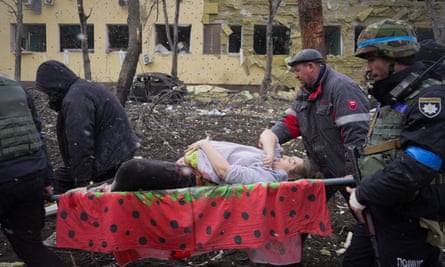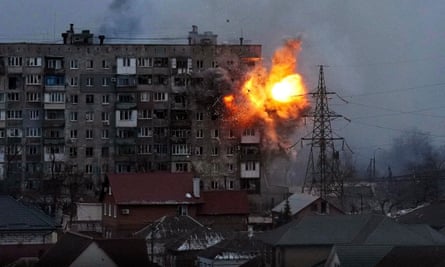Men in uniform are milling around outside a cafe in Sloviansk. Military trucks trundle past every few seconds. The town, in the Donetsk region, is the rear echelon of the Ukrainian counter-offensive. A black armoured car pulls up, and out of it slips journalist and film-maker Mstyslav Chernov. With his black T-shirt and trousers, black sunglasses, and black med-kit strapped to his thigh, he looks every inch the conflict reporter. He is 38. When he finally takes off his sunglasses, the intense gaze of his pouchy, tired-looking eyes makes him seem older.
That is hardly surprising. The war visited on Ukraine by its eastern neighbour since 2014 has destroyed many existences and transformed countless others. One of its consequences has been the creation of a generation of young conflict reporters. “In a country at war, if you’re a good documentary photographer, or at least trying to be good” – as he was before the Russian-backed takeovers in the Donbas and of Crimea – “you automatically become a war photographer.” One of the Kharkiv-born journalist’s earliest jobs was filming the carnage of the Malaysia Airlines flight MH17 crash site in 2014. Later, he worked in Syria, Karabakh, Iraq and Kurdistan.
Then in February last year, he and his team – stills photographer Evgeniy Maloletka and field producer Vasilisa Stepanenko – drove to Mariupol when everyone who could was getting out. They stayed inside the siege for nearly three weeks. For most of that time, theirs was the only news footage shot and broadcast – bringing to the world’s attention terrible images such as the bombing of the city’s Maternity Hospital No 3 on 9 March.

Now, Chernov has shaped this material into a feature-length documentary, 20 Days in Mariupol. It places the viewer right inside the nightmare that was Russia’s bombardment as the “circle tightened round the neck of the dying city,” as he put it. The film unfolds events day by day, punctuated by brief clips showing how footage was used in broadcast news, occasionally overlaid by Chernov’s quiet, restrained voiceover.
The full, jagged horror of war is illuminated unblinkingly in the film, which has just been chosen as Ukraine’s entry for the Oscars. It is tough to watch. Evangelina, aged 4, caught in an attack, dies on a hospital trolley. The doctors – who have urged Chernov to keep filming, “to show how these motherfuckers are killing children”, weep for her, and tenderly press her eyes shut. Kirill, 18 months old, is defibrillated, but the medics can’t save him. His mother wails: “Why? Why? Why?”
Conditions worsen, there is no power and barely a mobile connection. Chernov’s team struggles to find the breath of a phone signal with which to send their footage to their editors at the news agency Associated Press (AP). People loot shops, cook on fires in the streets. Hospitals run out of medicine. On a patch of waste ground a man heaves bodies into a trench. Asked how he feels, he replies: “If I start talking I’m going to cry … I don’t know what I feel right now. What are people supposed to feel in this situation?” It is as if emotions have departed any recognisable register; they cannot be entertained, let alone expressed.
The mayor of the city has estimated that 21,000 civilians were killed in Mariupol. The AP team could have been among them. What drove them onwards? Chernov, after all, has two young daughters to whom he briefly alludes in his voiceover in the film: a moment in which the journalists’ own dilemmas and emotions are lightly signalled.
They made their decision sitting in a cafe in Bakhmut in February last year, he says, watching a Russian news broadcast: “Because that’s always a good indicator of what’s to come.” They realised that the full-scale invasion was about to begin, and talked about “where we would meet this new wave of escalation. Mariupol seemed to be a right place to do it.” The story’s importance outweighed the risk. “It felt like this was the beginning of the third world war,” he says. “It still kind of does.”

Once inside the city, “it was just a matter of whether you had enough resources to keep working. And you keep going until you haven’t”. Even though they could have been killed at any time? Chernov answered as an air raid siren took up its regular, weary wail. “Every morning I’m there among the people lying on the floor of a hospital,” he says, recalling those grim days in Mariupol. “There are people without limbs and with heavy injuries. There are constant explosions. You don’t really know if you’re awake or if you’re asleep. You feel you have to force yourself to just start working. And then you look at all the people around you. The nurse comes who’s been there for two weeks and hasn’t slept, and the doctors come and start putting bandages on people, and another nurse comes with a bucket of snow and uses the melted snow to wash the floor.
“And you look at all of them and you think, ‘Why would I stop?’ So I don’t think it’s patriotism or a sense of duty at that moment, or even a kind of a journalistic impulse. It’s some kind of collective resistance to tragedy.” A rebellion, perhaps, against helplessness and impotence.
In the film a policeman named Volodymyr addresses the camera directly from the bombed maternity hospital, certain that if the world could only see the atrocity, the war would end. (This valiant man, who helped the AP journalists evacuate from Mariupol, and got himself and his family out too, was badly hurt in a double-tap missile attack this summer in the city of Pokrovsk.) The crew’s pictures did have an immense impact. But of course the war did not stop – and Russians claimed that the maternity hospital footage had been faked using actors.
Chernov remembers a similar pattern after his reporting at the crash site of MH17, the airliner shot down by Russian separatists over the Donetsk region in 2014. It was his second day in his career as a conflict reporter. Younger, more naive, he felt sure his footage would stop the war. On the ground it was beyond doubt that separatists were responsible, as has been subsequently proved in the courts. But, he says, the next day he turned on his TV and saw his images used to illustrate entirely opposite narratives, the Russians blaming the Ukrainians for the tragedy. “A lot of illusions were destroyed that day.”
Part of the point of taking his material to make 20 Days in Mariupol he says, was to use his footage at greater length. To give it more context. To go deeper, and ask more questions – and perhaps to take more control. He feels, he says, at a turning-point in his career, in which shooting for news is no longer satisfying. He is now working to chart the Ukrainian counter-offensive here in the Donbas, following the lives of a number of characters in the military. It’s difficult, he says, to get under the skin of soldiers. And liberation of villages often means liberating “ruins, and graves without names”.
I sense Chernov believes that it is in the extremity of conflict in which answers to the most essential questions about human life and death are to be found. Homer’s Iliad and much of Greek tragedy tells us he is right, but I’m not sure: is a war really the best place to seek the truth about human nature? “In a war zone, you do see very primal drives … [But] I found it astonishing how much support and care you see in a crisis where you think that everyone would just fight for their own lives,” he says. “That was an amazing discovery. That made it valuable.”
I wonder how audiences have reacted after seeing the world through his eyes, stripped brutally bare. “When people say it’s difficult to watch 20 Days in Mariupol, it’s not because there’s a lot of blood,” he says. No, I say: it’s because you see children dying. “But when you think about the people who live through these tragedies on the screen, there are always people supporting them. However traumatising and painful are the events that we are going through in Ukraine, we never go through them alone. We always have someone to hold our hands, to embrace us, whether it’s a volunteer or a firefighter or a policeman or a doctor or just your neighbour. I find that extraordinarily hopeful.”
It was this sliver of hope amid the violence that won it the audience award winner at the Sundance film festival in January, he thinks. His main fear, in fact, was that the film might retraumatise those from Mariupol, the people who lived through these terrible events. “But it actually doesn’t. Having unified experiences that are formed into stories is how we process our collective trauma,” he says. “Being a part of a society that processes its tragedies and histories and tries to go forward – that’s what keeps me going forward.”